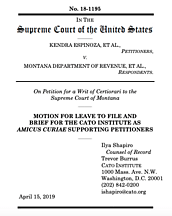Learn more about Cato’s Amicus Briefs Program.
Blaine Amendments — adopted by many states starting in the late 1800s as an anti-Catholic measure — prevent states from using public funding for religious education. Thirty-seven states currently have the amendments, and some courts have interpreted them excluding religious options from state school-choice programs — that is, preventing access to otherwise publicly available benefits purely on the basis of religion. In other words, Blaine Amendments let some states practice religious discrimination.
Montana created a program where people who donated to private-school funding organizations received tax credits. The program both encouraged school choice and allowed people to spend their own money how they saw fit. However, the Montana Department of Revenue used the state’s Blaine Amendment to exclude those donors whose money found its way to religious private schools, and, at the same time, it allowed non-religious private-school donors to benefit. During the ensuing legal challenge, the Montana Supreme Court not only ruled against the religious families that challenged the discrimination, it struck down the entire program, meaning both religious and non-religious donors wouldn’t receive tax credits.
Our friends at the Institute for Justice have petitioned the United States Supreme Court to hear the case, and Cato has filed a brief in support. Both Cato’s Center for Educational Freedom and the Robert A. Levy Center for Constitutional Studies have an interest in this case, so we teamed up to cover both the constitutional and policy angles of the issue. We argue that the Court should correct the Montana Supreme Court’s flawed reading of the First Amendment’s religion clauses and reaffirm that states cannot erode the Free Exercise Clause in the guise of strengthening the Establishment Clause. The Religion Clauses work together to help protect the freedom of conscience, not to prohibit school-choice programs that help both religious and non-religious schools.
The First Amendment’s Establishment and Free Exercise Clauses prohibit laws “respecting an establishment of religion, or prohibiting the free exercise thereof.” As Cato explained in a recent brief, the two clauses work together to protect individual freedom of conscience. However, states like Montana often use the Establishment Clause to justify the existence of Blaine Amendments. They argue that Blaine Amendments are necessary to prevent “an establishment of religion” by strengthening the wall of separation between church and state. But in the modern world, where government is so involved in giving public benefits like tax credits, it is impossible to maintain a complete wall of separation without discriminating against religion (as Blaine Amendments do), which is not what the Framers intended. Instead, the government must remain neutral toward religion and not disfavor religious people or organizations. In this sense, the Establishment Clause is a shield protecting the people from state religion, not a sword enabling government to discriminate against religious faith.
At the same time, school-choice programs help prevent the forced ideological conformity that is inevitable in public schools. Tax-credit programs like Montana’s allow parents to select schools that share their values, reducing the need to impose those values on others. In so doing, they improve our nation’s social and political cohesion and reduce conflict. Cato’s Public Schooling Battle Map tracks how public schools create conflict by forcing uniformity onto ideological diversity. Blaine Amendments merely fan the flames of the ideological conflicts that currently engulf public education.
Despite all these considerations, the Montana Supreme Court declined to properly consider the First Amendment implications of the state’s Blaine Amendment. Instead, it gave the Montana Department of Revenue a slap on the wrist for exceeding its procedural authority and destroyed the entire tax credit program rather than contend with the unconstitutional discrimination inherent in Montana’s Blaine Amendment. As school choice becomes more popular around the country, the question of religious discrimination and Blaine Amendments will become more salient. The Montana decision was just the latest in a series of federal and state courts decisions that are divided on the issue. That divide will continue without guidance from the Supreme Court. The Court should take this case to clarify that the Constitution requires religious neutrality, not discrimination.

This work is licensed under a Creative Commons Attribution-NonCommercial-ShareAlike 4.0 International License.




